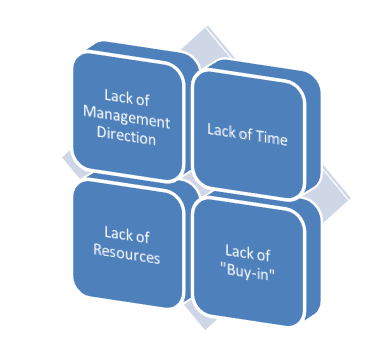So many companies set out with grand designs intended to bring about breakthrough improvements—sometimes goals are just internal, and sometimes the hope is for change across their supply chains.
 There are four major reasons that such transformations fail:
There are four major reasons that such transformations fail:
- Lack of management direction
- Lack of time
- Lack of resources
- Lack of buy-in
My guess is that if you are involved in managing any aspect of a small to mid-sized business, you have experienced more than one such failure (and more likely several of varying size and complexity).
Let's take a closer look at what's missing.
Lack of Management Direction
It is not our intention here to cast a bad light on management. In many cases they are doing their very best to come up with good—even, the best—ideas for improvement. They pay attention to planning. They lay the groundwork for execution.
In fact, it is often not even the planning or the execution that fails!
What fails is that the project—once complete—does not produced the intended results when improvements are measured (or, at least, observed).
Most likely, many things have been tried over the years.
Sometimes efforts produced pretty good results—but probably fewer than one-in-three of the attempts made.
Other efforts seemed to produce no positive results at all. Of course, lack of positive results didn't keep the "cost" side of the equation from being fulfilled "according to plan." The costs of improvement projects—the expenditures of time, energy, money, and management attention—always come to fruition. It's the benefits—the ROI (return on investment)—management was hoping for that seldom are achieved.
And, sadly, in some cases—perhaps, one in five or one in ten—the outcome of all the efforts was actually negative. Things just did not work as management had hoped. The whole idea had to be scrapped and newly instituted policies, procedures and more simply had to be unwound back to the starting point.
The problem—even for MBA-holders—is that the tools commonly applied by management simply cannot answer the three basic questions the answers to which management must surely know to provide reliable direction to their organization.
The three questions are…
- What needs to change?
- What should the change look like? And
- How should we effect the change?
One can be certain that your firm's ERP system cannot answer these questions. The data in your ERP system, or big data, might provide some clues along the way, but it has no answers for management regarding these fundamental questions.
There is, however, a reliable set of tools that have proven to be effective in organizations of every size and across a huge array of industries—from mom-and-pop operated doughnut shops to divisions of Fortune 500 firms; from the military to aerospace to education and, even, in the healthcare industry.
The toolset to which we refer is called simply, "The Thinking Processes" and it originated with Eliyahu Goldratt.
This simple set of tools can be leveraged to give management sound answers to the three fundamental questions. This, in turn, gives management what it needs to set a proper and reliable course toward improvement for the whole organization—or, even, the broader supply chain.
Lack of Time
The lack of time is really a symptom stemming from management's lack of direction.
Because management is frequently stumbling a bit trying to really understand which lever to push or pull and when, precisely, pushing is the right action on the "lever," versus pulling, there is too much time spent in "firefighting" activities.
Often, because each of the presently understood "levers" has been pushed and pulled at various times over the years, and because the results have not been reliable or consistent when the known "levers" have been used, management feels stuck in "firefighting" mode. In fact, not infrequently, firefighting consumes so much management time and energy, that there is almost no time left to spend on actually figuring out how to move toward real and sustained improvement.
Lack of Resources
Lack of resources, too, is generally just outfall—an undesirable effect—stemming from a lack of direction.
Like managers, the resources that might otherwise be used to move the organization down the path of ongoing improvement are being consumed in the day-to-day battle of putting out fires long enough to serve the customers on a day-to-day basis.
Lack of "Buy-in"
Frequently, by the time we are brought in to help companies or their supply chains, there has been a lot of "water under the bridge." Management has already tried lots of different approaches to improvement over several years. Yet, to date, there is still little agreement on the fundamental causes of the problems that plague the operations (or supply chain), let alone finding agreement on the path to a remedy.
A good many of the manager and employees are simply burned-out from trying so many different things that didn't really bring significant improvement.
At this point, any "new and improved" ideas are met with a jaundiced eye and only half-hearted tries.
Nobody wants to buy-in to another loser attempt that consumes more time, more energy, and more money than anyone has to spare.
The "Thinking Process" to the Rescue
Interestingly, when we work with clients using the "Thinking Process," we never ask people to try something new that we brought in from the outside. We don't tell people how to improve their company or their supply chains, or how to make more money.
What we do is help them unlock what they already know—we call it "tribal knowledge"—and see what they already know in a fresh new light that helps them discover their own simple, reliable path toward a process of ongoing improvement.
This method automatically gets "buy-in" at the same time: nobody sabotages or fights against their own ideas and methods. If they created them, they will work hard to make them effective.



